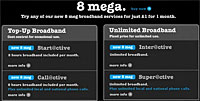 The mobile Internet handset – developed by Danger and manufactured by Sharp Corporation – will be made available on service contract for £68.70 (~€100, ~US$125).
The mobile Internet handset – developed by Danger and manufactured by Sharp Corporation – will be made available on service contract for £68.70 (~€100, ~US$125).
For just £10.30 (~€15, ~$18.84 USD) a month, users can enjoy unlimited data use when combined with any of T-Mobile’s voice plans, with the monthly data charge being waived for the first month for new T-Mobile Sidekick II customers.
 The feature-stuffed handset includes a mobile phone, push email, instant messaging, HTML Web browser, text-messaging, calendar, address book, an integrated digital camera and the option to download applications and content.
The feature-stuffed handset includes a mobile phone, push email, instant messaging, HTML Web browser, text-messaging, calendar, address book, an integrated digital camera and the option to download applications and content.
Users will also get access to a Web-based, online account to manage their data from the desktop.
“The T-Mobile Sidekick II’s ease-of-use and complete set of voice and data applications have made it the featured product in our ‘Internet in your pocket’ initiative,” said Michael Schuld, Vice President Terminal Management T-Mobile Germany.
 Beating at the heart of the T-Mobile Sidekick II is Danger’s “hiptop” software and services infrastructure.
Beating at the heart of the T-Mobile Sidekick II is Danger’s “hiptop” software and services infrastructure.
Claimed to deliver a “superior mobile Internet experience to end users”, the thin client/server system takes care of the secure transmission of data between the network and the device, accelerates Web-page downloads and automatically opens files sent via email.
“Danger’s popular mobile Internet experience, combined with T-Mobile Germany’s excellent network, customer care and marketing might is an ideal match,” PR-ed Hank Nothhaft, Chairman and Chief Executive Officer of Danger.
 Also known as the Hiptop 2, the 130 x 66 x 22 mm (5.1″ x 2.6″ x 0.9″) handset features a flip Transflective TFT 240×160 pixel screen and an integrated VGA (640 x 480 pixel) camera.
Also known as the Hiptop 2, the 130 x 66 x 22 mm (5.1″ x 2.6″ x 0.9″) handset features a flip Transflective TFT 240×160 pixel screen and an integrated VGA (640 x 480 pixel) camera.
The tri-band (900/1800/1900 MHz GSM/GPRS unit comes with 32 MB RAM and 16 MB Flash, with a built in speakerphone and Lilliputian QWERTY keyboard.
 T-Mobile are also releasing a “trendy” version of the Sidekick, resplendent in distinctly un-macho pink sparkly bits.
T-Mobile are also releasing a “trendy” version of the Sidekick, resplendent in distinctly un-macho pink sparkly bits.
But that’s not for us. Oh no.
 The European Commission has announced plans to create a single set of European Union rules on broadcasting and the wireless spectrum.
The European Commission has announced plans to create a single set of European Union rules on broadcasting and the wireless spectrum. Europe is also looking to free up the highly lucrative wireless spectrum – currently worth something like €9 billion (~US$11bn ~£6bn) a year – and hopes that digital frequencies used by services such as mobile phone operators, police radar and radio will be brought under centralised EU control by the end of 2005.
Europe is also looking to free up the highly lucrative wireless spectrum – currently worth something like €9 billion (~US$11bn ~£6bn) a year – and hopes that digital frequencies used by services such as mobile phone operators, police radar and radio will be brought under centralised EU control by the end of 2005. Saucy sensation seekers and sleazy surfers will be rewarded with their very own porn-friendly set of .xxx domains before the end of the year.
Saucy sensation seekers and sleazy surfers will be rewarded with their very own porn-friendly set of .xxx domains before the end of the year. It is hoped that pornsters will voluntarily shift from their current .com addresses, thus making it easier for parents to filter out adult material, but in an industry not exactly renowned for its high moral stance, we anticipate that not all will be wiling to switch from their lucrative, high profile domains.
It is hoped that pornsters will voluntarily shift from their current .com addresses, thus making it easier for parents to filter out adult material, but in an industry not exactly renowned for its high moral stance, we anticipate that not all will be wiling to switch from their lucrative, high profile domains. Unlike the milk-snatcher Margaret Thatcher, the ICANN’s decision proves that they are definitely for turning – in November 2000, the ICANN staff rejected ICM Registry’s first application after objecting to domains such as .kids and .xxx.
Unlike the milk-snatcher Margaret Thatcher, the ICANN’s decision proves that they are definitely for turning – in November 2000, the ICANN staff rejected ICM Registry’s first application after objecting to domains such as .kids and .xxx. AOL has announced it will broadcast the Live 8 concerts in London, Philadelphia, Paris, Rome and Berlin online for free.
AOL has announced it will broadcast the Live 8 concerts in London, Philadelphia, Paris, Rome and Berlin online for free. Geldof boomed: “The G8 leaders have it within their power to alter history. They will only have the will to do so if millions of people show them that enough is enough.”
Geldof boomed: “The G8 leaders have it within their power to alter history. They will only have the will to do so if millions of people show them that enough is enough.” Bulldog Communications, the Internet and telecom group owned by Cable & Wireless, is rolling up its sleeves and shouting “Oy! Let’s be ‘aving you!” at its rivals as it doubles the speed of its broadband offering to a super-swifty 8 megabits-per-second from 4 megabits, and spread it across the UK.
Bulldog Communications, the Internet and telecom group owned by Cable & Wireless, is rolling up its sleeves and shouting “Oy! Let’s be ‘aving you!” at its rivals as it doubles the speed of its broadband offering to a super-swifty 8 megabits-per-second from 4 megabits, and spread it across the UK. “Eight meg from Bulldog, with no download caps, gives customers the freedom to use the Internet as they wish,” he growled before retiring to his executive kennel.
“Eight meg from Bulldog, with no download caps, gives customers the freedom to use the Internet as they wish,” he growled before retiring to his executive kennel. Frontier Silicon has launched a new module that claims to bring personal-video-recorder (PVR) like capabilities to DAB digital radio.
Frontier Silicon has launched a new module that claims to bring personal-video-recorder (PVR) like capabilities to DAB digital radio. Recordings can be saved onto a memory card on the same radio or played back on any compatible audio unit.
Recordings can be saved onto a memory card on the same radio or played back on any compatible audio unit. Frontier Silicon’s software provides an interface through which EPG and dynamic service information (DLS) can be viewed, with scrolling text allowing information ‘wider’ than the 16-character screen to be seen.
Frontier Silicon’s software provides an interface through which EPG and dynamic service information (DLS) can be viewed, with scrolling text allowing information ‘wider’ than the 16-character screen to be seen. A survey by Cingular Wireless has revealed that men spend more time yakking on mobiles than women.
A survey by Cingular Wireless has revealed that men spend more time yakking on mobiles than women. Women aren’t afraid to get snapping either, with 60 percent using their camera feature frequently or occasionally against 40 percent of men using it as often.
Women aren’t afraid to get snapping either, with 60 percent using their camera feature frequently or occasionally against 40 percent of men using it as often. Research from BT shows that the number of users connecting to the Internet via broadband has overtaken dial-up subscriptions for the first time, with 7.4 million broadband customers (including cable) now online.
Research from BT shows that the number of users connecting to the Internet via broadband has overtaken dial-up subscriptions for the first time, with 7.4 million broadband customers (including cable) now online. High speed connections are also good news to those selling goods and services online, with an explosive growth in the consumer market for buying media online, such as films, music and television.
High speed connections are also good news to those selling goods and services online, with an explosive growth in the consumer market for buying media online, such as films, music and television. Two million cable customers now enjoy broadband connectivity through NTL and Telewest.
Two million cable customers now enjoy broadband connectivity through NTL and Telewest. Cardiff vicar Reverend Kimber is hoping that by introducing wireless broadband access from the pews of his city centre church, more people will be encouraged to join his flock at St John’s Church.
Cardiff vicar Reverend Kimber is hoping that by introducing wireless broadband access from the pews of his city centre church, more people will be encouraged to join his flock at St John’s Church. After Kimber approached BT, the company agreed to fill in the gap in Cardiff’s wireless broadband network and fitted the church with its own Openzone node, providing access to surfers sitting in the corner of the north aisle at St John’s.
After Kimber approached BT, the company agreed to fill in the gap in Cardiff’s wireless broadband network and fitted the church with its own Openzone node, providing access to surfers sitting in the corner of the north aisle at St John’s. The Training Foundation has launched its Ready for Work online training programme, an employment-awareness course free to all young people in (or recently in) full-time education and those in modern apprenticeships.
The Training Foundation has launched its Ready for Work online training programme, an employment-awareness course free to all young people in (or recently in) full-time education and those in modern apprenticeships. Each self study course ends with a short test to check the learner’s understanding, with an 80% or better grade qualifying the student for an optional Ready for Work Certificate and Ready for Work Handbook.
Each self study course ends with a short test to check the learner’s understanding, with an 80% or better grade qualifying the student for an optional Ready for Work Certificate and Ready for Work Handbook. David Frost, Director General of the British Chambers of Commerce roared his approval: “We need initiatives such as Ready for Work, which can help to ensure that young people leaving full-time education and training are equipped with skills that are both relevant for the workplace and will help advance their careers.”
David Frost, Director General of the British Chambers of Commerce roared his approval: “We need initiatives such as Ready for Work, which can help to ensure that young people leaving full-time education and training are equipped with skills that are both relevant for the workplace and will help advance their careers.”